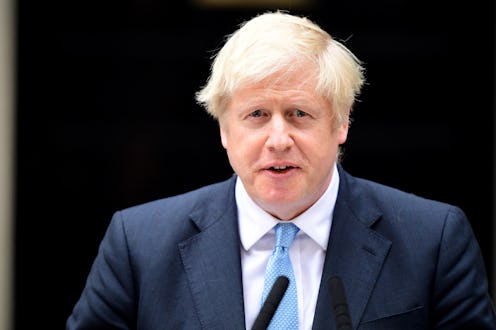News
Here's A Breakdown Of Where We Stand On Brexit Right Now

Pay the slightest bit of attention to the news and the three B's are all you'll see: Brexit, Boris Johnson, and the state of British politics. After taking over from Theresa May, Johnson has caused controversy after controversy. First, he suspended Parliament in what he described as a bid to stop MPs from debating a new Brexit agreement. Then he threatened to expel Conservative MPs who didn't support him in a recent parliamentary vote. Now, it seems the nation is bracing itself for an early general election. So, er, what is happening with Brexit exactly?
At the end of August, the Queen agreed to a request from Johnson to suspend Parliament. Per the BBC, the suspension will begin between Sep. 9 and 12 and end on Oct. 14. The move caused outrage from some MPs, including Labour leader Jeremy Corbyn. "Suspending Parliament is not acceptable, it is not on. What the Prime Minister is doing is a smash and grab on our democracy to force through a no deal," Corbyn said.
A group of politicians made it their aim to introduce legislation to stop Johnson's Brexit plans. And that's when things started to get complicated.
Johnson's Loss
On Tuesday, the Prime Minister lost an important parliamentary vote that asked MPs whether they wanted "to take over control of the Commons order paper to legislate against a no deal," as iNews reports.
Johnson only had a majority of one before the vote took place, but this was quickly altered when Conservative MP Phillip Lee switched to join the Liberal Democrats, per the Guardian. Additionally, 21 Conservative MPs linked up with opposing parties, per the BBC, causing Johnson's government to lose by a vote of 328 to 301.
The result of the vote allowed politicians to take control of the parliamentary timetable and propose a bill that would delay the UK's exit from the European Union until at least Jan. 31, 2020. Currently, the UK is poised to leave at 11 p.m. on Oct. 31. The Prime Minister has stated that he is not willing to ask the EU for a further extension, per the Guardian, and will leave via a no deal if it comes to that.
Now that the government's opponents have some form of control, they have immediately sought to pass a bill asking for yet another delay if a deal cannot be agreed by Oct. 19. As the BBC explains, the debate on the bill began today (Sep. 4) at at 3 p.m, with an initial vote taking place at 5 p.m. A second vote will occur at 7 p.m and, if the bill is passed, it will move to the House of Lords. The earliest it could become law is expected to be Monday, Sep. 9.
A Potential General Election
After losing the vote and expelling the 21 MPs who opposed him, Johnson has announced that he will ask Parliament to call a general election on Oct. 15. He is adamant that, no matter the fate of today's bill, he will not request another Brexit delay and said "the people of this country will have to choose" instead.
But there's a catch. To make an early general election happen, the Fixed-term Parliaments Act 2011 dictates that Johnson will need a majority of two-thirds. Effectively, Labour can block the Prime Minister's intention. In fact, Corbyn has said his party will not vote for an early election until a bill preventing a no-deal Brexit has been passed, reports the Independent. Nevertheless, Johnson could potentially be holding an election vote in the Commons at 8.30 p.m. on Wednesday night, reports the BBC.
What Happens Next?
By the end of the week, the plan of action should be a little clearer. The bill to prevent a no deal will have been passed or rejected, and the Prime Minister may have determined whether he has the power to secure an early general election.
If the no-deal prevention bill fails, a vote of no confidence in Johnson's government may be held. If more MPs vote for than against, the government would have 14 days to win a new vote of confidence, reports the BBC. Or, an alternative government with a different Prime Minister could be set up in order to win the vote.
Whether the UK will leave the EU on Oct. 31 remains up in the air. The EU could reject requests for a further extension, pushing MPs right back to square one. It may also reject any new proposal that doesn't include the Irish backstop, a way of stopping border checks between Northern Ireland and the Republic of Ireland.
There is, of course, the option to revoke Article 50 and pretend the referendum never happened. Or for a second referendum to be held. But, as the BBC explains, that will only be a possibility if a new government comes into power.